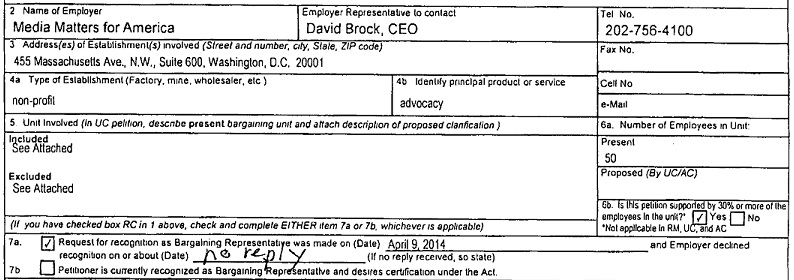As we reported last Thursday, when SEIU Local 500 came knocking on Media Matters’ door, years of spewing pro-Big Labor rhetoric couldn’t lead Media Matters’ CEO David Brock to enter into a voluntary recognition (a.k.a. “card check”) with the union. We were curious about some of the particulars of the SEIU’s representation petition, so we filed an open records request with the National Labor Relations Board to get it. You can read it here, and we’ve excerpted the key item below:
The petition shows that SEIU made a request for voluntary recognition as the exclusive bargaining agent for all 50 of Media Matters’ non-supervisory (unionization eligible) employees. Brock’s response? “No reply.”
Instead, Brock and Media Matters lawyered up, retaining a top-flight law firm with expertise in labor relations, including “union organizing campaigns.” Brock’s actions seem to run contrary to his group’s assertions that it’s an all-caps “FACT” that unions “do not reduce business competitiveness.”
We agree with Brock that it’s best to let employees decide whether to unionize in the privacy of a voting booth by secret ballot: Perhaps he could get behind the Employee Rights Act, which would extend his practice of defending employees’ secret ballots to all National Labor Relations Act workplaces?
That isn’t likely. Since 2009, unions have paid Media Matters for America (and its “partner project,” Media Matters Action) $735,000. Among those unions is the Service Employees International Union, which paid Media Matters’ liberal media criticism empire $150,000 over the period. It might not be enough to “buy” an easy unionization at Media Matters, but it’s probably enough to keep David Brock from endorsing the rights of employees who don’t work for him at other organizations.




